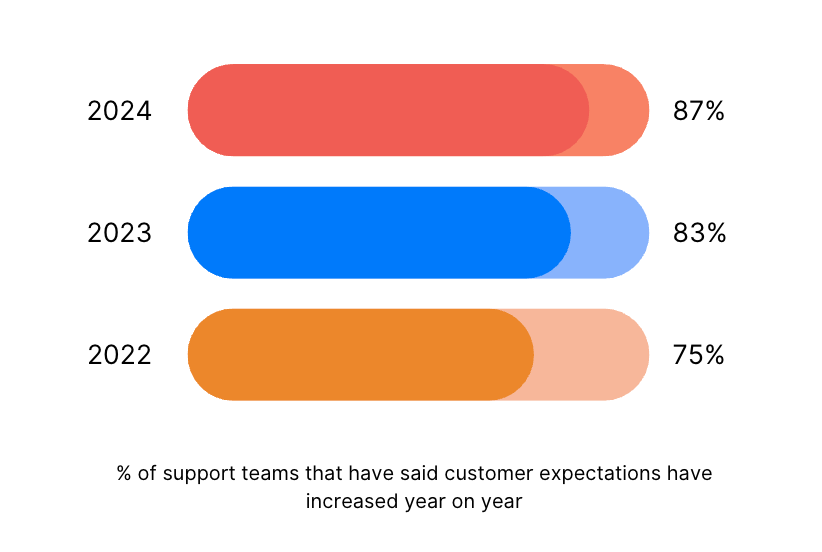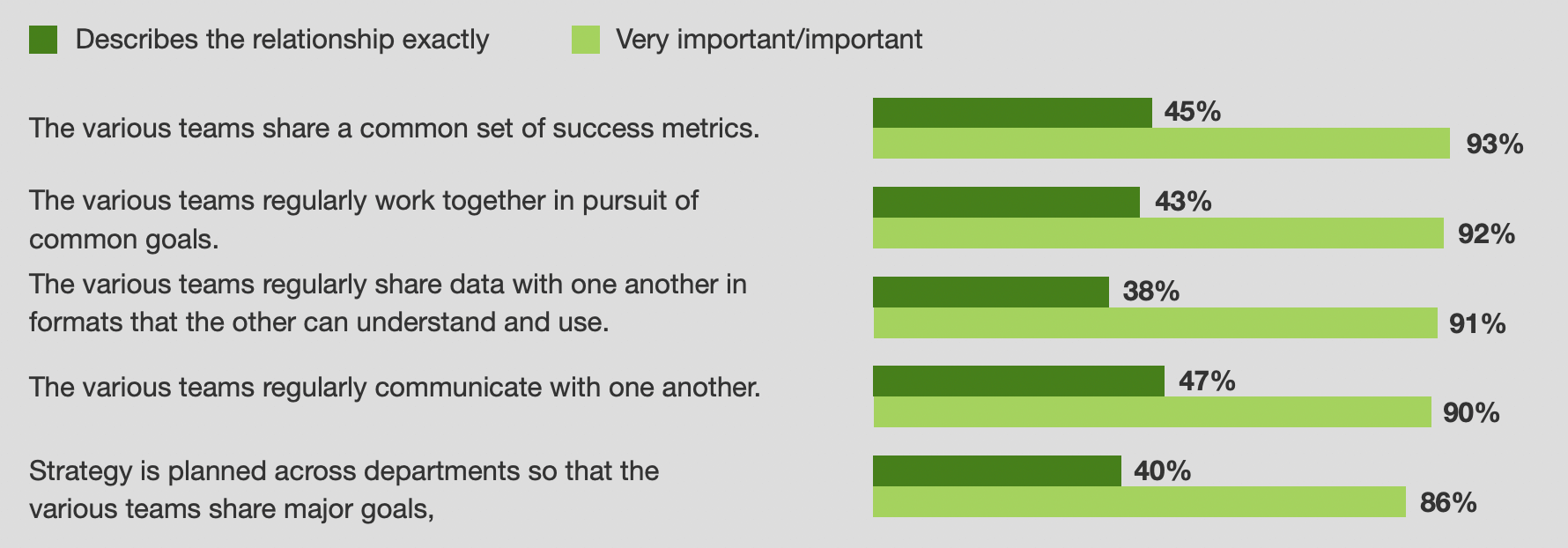
Top 30+ Customer Experience Statistics to Know in 2025
Record, transcribe and summarize conversations with one click.
If you were to list a business’s most crucial operations in 2024, customer service would probably be among the most important ones. Stiff competition means a customer can simply switch to a competitor if your business fails to provide a stellar customer experience. Having been a marketer for over a decade, I deeply understand the impact of a good customer experience. So, I’ve compiled over 30 customer experience statistics you should know for 2025.
Customer experience stats (top picks)
In 2024, 73% of customers feel that brands treat them as unique individuals, an increase of 39% from 2023.
50% of businesses state that AI helps them offer 24/7 customer support, 45% state that it benefits from time savings, and 44% state that it helps them resolve customers’ problems quicker.
73% of consumers believe that a good customer experience is among the most important factors motivating them to make a purchase.
77% of CRM leaders believe AI will handle most ticket resolutions by 2025.
23% of CRM leaders do not use AI in their customer service operations, ultimately impacting resolution times and customer satisfaction.
General customer experience statistics
This section explores some of the major customer experience trends, areas of growth, and general statistics you should be aware of for 2025.
Growth and adoption of CX strategies
How are organizations adopting CX strategies? And how has CX grown in recent years? Here is all you need to know:
Personalization has been one of the primary goals of customer service in recent years. This is visible in the fact that 73% of customers feel that brands treat them as unique individuals, an increase of 39% from 2023.
However, only about 49% of customers feel that brands use their information in a truly beneficial manner.
77% of customer support teams believe using AI will increase customers’ expectations of faster response times.
To cope with the increase in customer experience in recent years, 53% of customer support teams are helping customers when and where they need the most help. 52% focus on providing fast and on-demand support, while 48% proactively answer customers’ questions.
Sources: Salesforce, Intercom
Importance of CX in business success
Businesses are increasingly realizing the importance of good customer experience, leading to greater focus.
The demand for better customer service is one key driver of businesses' greater focus on customer experience. In 2024, 87% of customer service teams stated that customer expectations were higher than ever, up from 83% in 2023 and 75% in 2022.
61% of customers preferred to opt for the faster response AI could offer rather than wait for a customer support agent to attend to them.
As a result, 45% of customer support teams have adopted AI in some form or another.
Among the benefits AI offers teams, 50% state that it helps offer 24/7 customer support, 45% state benefits from time savings, and 44% state that it helps with quicker resolutions to customer problems.
Cost efficiency, customer feedback analysis, and increased support quality and consistency stand at 35%.
 Sources: Intercom
Sources: Intercom
Customer satisfaction and loyalty statistics
Improvements in the overall customer experience directly impact customer satisfaction and loyalty.
Customer retention rates and CX impact
How does customer experience impact retention rates? Here are a few important statistics:
88% of customers say that good service will likely make them purchase again.
54% of customers can solve routine issues by themselves at organizations that use self-service mechanisms.
The use of voice AI has benefited both customers and businesses. 51% of customers have interacted with voice AI, and 60% want companies to adopt it.
According to a customer experience study by Zendesk, 58% of customer service professionals state that lacking consumer data often leads to negative experiences.
Sources: Salesforce, Zendesk
Influence of CX on Customer Lifetime Value (CLV)
Improvements in CX have tremendous potential to increase CLV. Here are a few statistics that shed light on this benefit.
73% of consumers believe that good customer experience is a key purchasing factor.
The average consumer tells at least six people about a positive customer experience.
Companies that focus on CX are 60% more profitable than their competitors.
B2C customers who switch between multiple channels will likely lose interest in a brand’s products or services. Omnichannel customers shop 1.7 times more than those who use a single channel, leading to increased revenue.
Sources: Zippa, McKinsey & Company
Use Notta's AI transcription tool to quickly and easily transcribe audio and videos. We guarantee accuracy and ease of use.
The role of personalization in CX
What impact does personalization have on the overall customer experience? With the role of AI becoming increasingly prominent, personalization has become a key focus area.
Personalization and its effect on customer satisfaction
How does personalization affect customer satisfaction? Here are some startling statistics:
78% of customers expect more personalization in interactions than ever before.
Given this context, 84% of CRM leaders see AI as crucial in interacting with modern customers.
Customer Relationship Management (CRM) tools are critical to ensuring personalization at every step. 75% of CRM leaders say that the use of AI has increased their customer service response times.
Additionally, 86% of CRM leaders who use AI say it has positively impacted customer satisfaction. Thus, incorporating AI in customer experience management offers plenty of benefits.
Given AI's impact on personalization and, as a result, customer retention, 56% of “CX Trendsetters” plan on using AI to improve personalization. In comparison, just 22% of “CX Traditionalists” plan on doing the same.
Data and AI in driving personalized experiences
What is the role of larger amounts of data and technologies like AI in driving personalized experiences? Here are a few statistics you should be aware of:
Technology plays a crucial role in improving the overall customer experience. 82% of the top-performing companies state that they pay closer attention to the human experience around digital and tech.
43% of customers would pay more for more convenience, and 42% would pay more for a friendly and welcoming experience.
32% of customers state that using up-to-date technology is crucial to the customer experience. This number is low because most consumers only link the use of technology to a positive experience when the technology fails.
For services customers truly value, 63% said they would be willing to share their data. However, 88% stated that how much they trust a company is crucial in deciding whether they are willing to share personal information.
Despite the increasing use of technology and AI, customers strongly prefer a combination of humans and machines rather than one of the two. In fact, only 3% of US customers want their experience to be as automated as possible.
Sources: PwC
Omni-channel experiences and CX consistency
Omnichannel experiences improve customer satisfaction. A well-executed strategy ensures customers don’t have to start all over again or provide the same information when switching to a different channel. The next two sections offer key insights into how omnichannel experiences help improve overall customer experience.
Statistics on cross-channel customer expectations
This section lists a few key statistics on customer expectations with regard to cross-channel experiences.
62% of customers want to be able to engage with brands across multiple channels.
An additional 77% want internal teams and departments to collaborate so customers don’t have to repeat themselves each time.
However, 77% of brands said they struggle to create a cohesive journey across multiple channels.
79% of customers also want a fast response when connecting with a brand on any given digital channel.
Just over 40% of brands or businesses believe they are “very successful” at identifying areas for customer experience (CX), being there for customers at every point of need, and keeping their businesses connected with the customer’s voice, among other aspects.
When asked how many were “successful,” the numbers rose to 79% to 91% of all brands.
 Sources: Khoros
Sources: Khoros
Impact of consistency on brand perception
While building and maintaining a well-functioning omnichannel strategy is crucial, what impact does this consistency have on brand perception? Here are some statistics:
While 44% of brands think it is important to make product recommendations based on past purchases, only 11% of customers found this to be important to their brand preference.
44% of customers think it is “very important” that brands respond quickly to customer queries with helpful, personalized answers.
Consolidating data across departments for a single view of the customer and coordinating engagement across all touchpoints will likely result in loyal customers, with 52% and 55% of respondents citing these aspects as crucial, respectively.
43% of customers are more likely to buy something from a brand after a good customer experience, and 41% will do so after a good marketing experience.
79% of customers find chatting with an online customer service representative to solve their queries valuable.
67% of customers also found it valuable to communicate with a brand via its mobile app.
Disney and Bank of America are among the brands known for their omnichannel CX.
Disney’s website functions smoothly across mobiles and desktops, and the My Disney Experience tool seamlessly plans your trip on both devices, seamlessly synchronizing across platforms. You can use the mobile app to locate attractions while in the park, and the TVs in the Disney resort also welcome you into your room by name.
Bank of America seamlessly carries out cheque depositing, bill reminders, and other such processes across the company’s mobile and desktop apps. The apps also protect you by double-checking any potentially fraudulent transactions, no matter which device you use.
Sources: Khoros, Disney, Bank of America
CX trends and challenges in 2025
What customer experience trends are we likely to witness in 2025, and what challenges will they bring? The two sections shed some light on these key aspects.
AI and machine learning in enhancing CX
The data presented below demonstrates how AI and machine learning are set to play a key role in improving overall customer experience.
One of the biggest trends that brands notice in the CX space is that customer expectations are increasing, and brands are struggling to keep up.
Among the key challenges CRM leaders face, 21% are adapting to customer expectations, 22% are facing challenges trying to understand customer needs better, and 21% find it tough to scale operations with company growth.
AI is set to play a big role in CX. In fact, it already does. 77% of CRM leaders believe that AI will handle most ticket resolutions by 2025.
71% of CRM leaders also plan to increase investment in AI in 2024.
Only 68% of organizations surveyed by HubSpot use CRM tools in their customer support operations.
86% of CRM leaders also say that AI makes customer correspondence more personalized.
86% of CRM leaders using AI say that it has helped their operations scale.
However, despite this, there is still scope for improvement. A whopping 23% of CRM leaders do not use AI in their customer service operations whatsoever.
Sources: HubSpot
Challenges to achieving high-quality CX
The road to maximum customer satisfaction is still riddled with challenges. What are these, and to what degree are organizations and CX teams facing them? Here are some key insights:
Despite the benefits of offering customers a better customer experience, businesses are still lagging for multiple reasons. In fact, 38% of customers feel that they have had negative experiences with brands much more than brands think they do.
Some of the reasons organizations are falling behind include:
Poor customer service experiences - 43%
Teams having different strategies and goals - 30%
Teams don’t share data or work with incomplete data - 29%
Teams are simply not working together successfully - 25%
Organizations are too siloed - 37%
Tools have technical limitations that impede integration - 64%
Sources: Khoros
The bottom line
The customer is king, and the best way to make them feel good is to offer them a consistently high-quality customer experience. We listed over 30 insightful customer experience statistics highlighting CX's importance. When strategizing, you must ensure you document every part of your discussion, and an AI notetaker like Notta can help you accurately document and transcribe every detail.